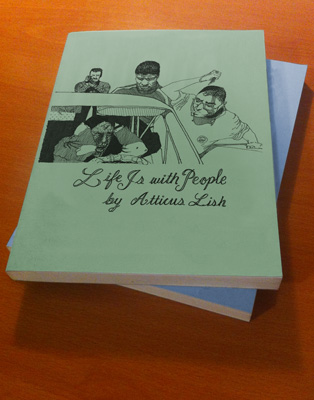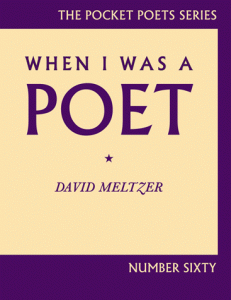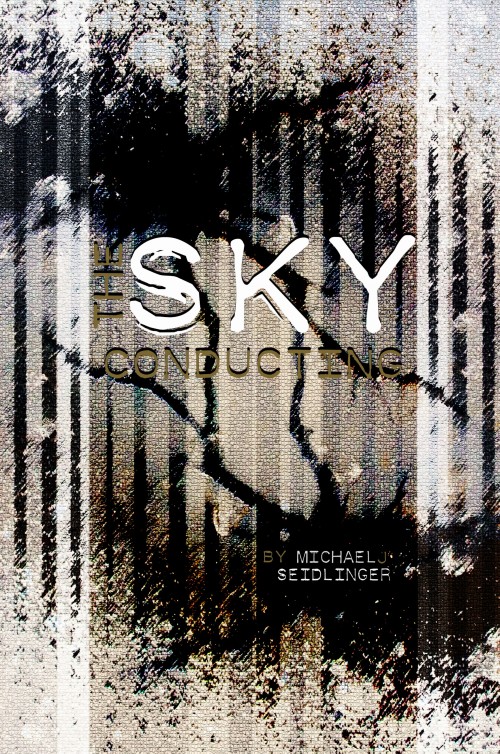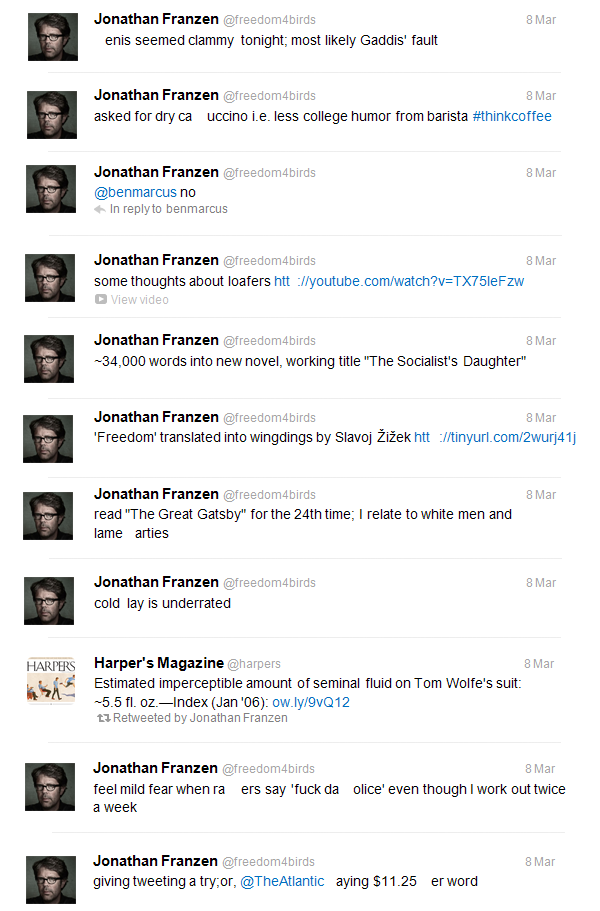When I Was a Poet
By David Meltzer
City Lights Publishers, 2011
144 pages, $10.95
[Reviewer’s Note: I received a review copy of David Meltzer’s When I Was a Poet directly from City Lights Publishers last summer. While reading the book on a quick trip for a family-related emergency of sorts, I began to fill a small notebook with short bursts of a fast-clipped poem-series. This poetic assemblage mixing David’s lines between my own responses generated the gist of what became the official book review (see below)—the poem-series itself follows. I had the honor of reading this poem in David’s presence as part of a group reading celebration for When I Was a Poet @ the Meridian gallery here in San Francisco hosted by SF State Poetry Center on Sept 1, 2011. It’s a pleasure to see both versions find a home on HTMLGIANT thanks to Ben Mirov. Rock on. -pjd]
March 28th, 2012 / 3:26 pm
The Birds’ Ulterior Motives Get Them Killed: An Interview with Craig Morgan Teicher

Congratulations on Cradle Book, published by BOA in 2010. It is a lovely book of what I thought were fable-like prose poems. But BOA has listed the book as fiction. Do you see it as a work of fiction?
14 laptops or hammers
2. Ander Monson wades into the whole D’Agata thingy.
2. Matt Mullins interview.
1. I Take Back the Sponge Cake is a choose-your-own-adventure collaboration between poet Sierra Nelson and visual artist Loren Erdrich.
1. Seems to me we flash fiction folks don’t really get enough book contests. Hell, here’s one.
14. Duck tape and eggs greeted vehicles traveling down Highway 3 in the early morning hours of Friday, March 16.
5. We learned about student evaluations from a sociologist. She said studies show men rate female professors lower than male professors on student evaluations, but men and women rate male professors the same. OK.
6. A little breakfast treat on tennis and DFW.
The woman is my own regret.
The children are my friends,
how they cannot reach, or save
me. The birds are my eyelashes,
the wolves are my hands.
Noah Cicero interviews Elizabeth Ellen

Elizabeth Ellen & Kendra Grant Malone
Elizabeth Ellen writes in the classical sense: she focuses her energy on the story being told. She doesn’t two things most writers fall into: she doesn’t over styilize and use experimental weirdness to express emotion. Her stories are always very linear, have beginning/middle and end. But at the same time she doesn’t write in cliché language and have big explosive plots involving guns and beautiful people walking around. Fast Machine by Elizabeth Ellen takes the middle ground between alternative/experimental and popular literature.
The stories come out strange and unique, I think because Elizabeth Ellen is inspired by writers like Dave Eggers, but at the same time because of the circumstances of her life she did not get an MFA and go through many writing workshops, her writing turned to be a marriage of Bukowski and Eggers. The writing has some of that nice Eggers clarity and smoothness but at the same time covers Bukowski themes like humiliation, failed romantic relationships, divorse, raising a child in difficult circumstances, violent sex, drinking, weight gain, disapointment, in general about failure and hardship.
The Perfect Stutter: My Only Wife by Jac Jemc

Consider the last breath of Jac Jemc’s forthcoming novel My Only Wife:
“My wife slid the key in the lock, turned it, and and then slipped down the stairs.
The one truth I know is that I came home.
I climbed the stairs, light and unknowing.
I slid my own key into the lock, turned and pushed.”
Notice the repetition of the word “and” in that top line. It’s a stutter so subtle it could be mistaken as a typo, but I hope it’s not a typo. I hope it’s strategically placed, because I believe it’s perfect. Such a small thing: the word and. But such a large thing it conveys.
Hesitation. Frozen in the moment, if only for a moment.
So beautifully rendered but emotionally wrenching, Jemc’s novel brings to mind images by Lucien Freud:

Life Is with People by Atticus Lish

There was a new release from Tyrant Books yesterday. Life Is with People by Atticus Lish is 120 pages of illustrations and text by Atticus. The covers come in four different colored papers. They are thick and nice. The illustrations and text are printed on composition (lined) paper that is thick and nice. This isn’t something I can really try to sell to you. You either like it, or you do not. You either get it, or you do not. I am not saying one is better than the other. Personally, I see each page as a poem that takes awhile to sink in. I can’t really look at too many of them in one sitting. I once looked at a stack of 300 of them in one sitting and felt mental and ill for ten hours afterward. These books cost $20 to make, so I am selling them for $20. If we sell all of them, we break even. I’m not being all, “Look how generous I am.” I am being all, “I think this book is so important that I do not want any kind of deterrence from buying it for those who may not be able to afford it.” Book design by the good-eyed Ryan P. Kirby. There were only 500 of these produced. Do not hesitate. Actually, I am so behind this book that if you order one and think it was not worth your money, you can call me and tell me why and if you make one iota of sense, I will reimburse you. Cool? Cool. Thank you kindly.
The books is available through SPD, the Tyrant website, and will be in limited stores very soon.
[Previews at Vice.]
“Aaliyah would have been on Twitter. It is fucked up that she is dead.”: An Interview with Patricia Lockwood, Poet Laureate of Twitter

Patricia Lockwood is a poet. (A poet. A very good poet.) She also uses Twitter in interesting ways. Earlier this year, her series of SEXTS got attention from Rhizome, and then The Huffington Post & The New Yorker.
And I look at those tweets and I wonder, “How does someone do that?” Not get attention, though. I mean write those. How? So I asked.
***
So, I was initially pretty dismissive of Twitter. And then, at some point, I noticed how funny it could be and found it to be a mostly worthwhile distraction. And then—probably while reading the fake Christopher Walken feed—I began to think there could be something kind of poetic about Twitter. That each little update could be a joke, a persona poem, a zen koan.
Did you sense the “poetic” potential in the Twitter post from the beginning or did your approach to Twitter change?
It took me about ten years to join Twitter because, like old men everywhere, I “did not get it.” What is the … where are your mentions … what is hashtag … who is a belieber? When I did join, I spent my first week livetweeting the movie Bambi, focusing specifically on the puberty of Bambi and Thumper, and was subsequently unfollowed with extreme prejudice by the few poets who had charitably followed me in the first place. (This still happens! A real writer will follow me and then four days later be like “what the freak is this” and it is goodbye. CAN’T believe you wrote a tweet about Jesus jelqing.)
OK, so scrolling back, I see that one of my earliest tweets was “I want to see the Beethoven movie where Beethoven finally manages to tear his way out of the dog’s body and play something good on the piano.” About two weeks later I sexted for the first time, like a teen. So it wasn’t so much that I saw the possibilities right away as that … Twitter is the perfect way to disseminate the kind of writing that comes most naturally to me.
READ MORE >






